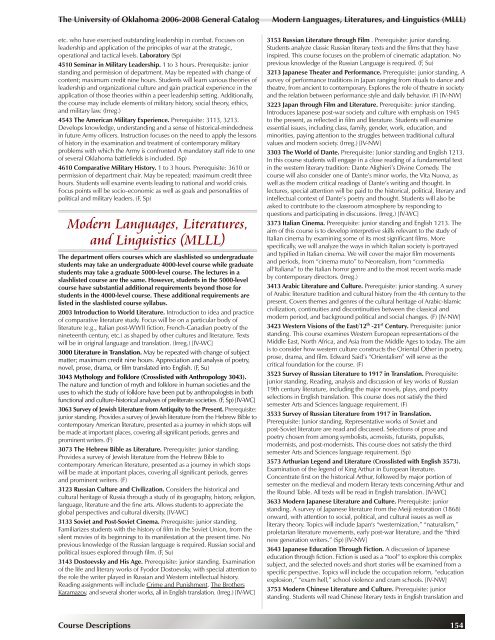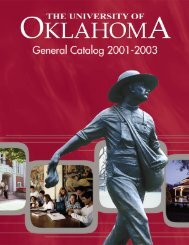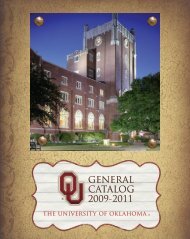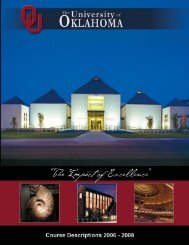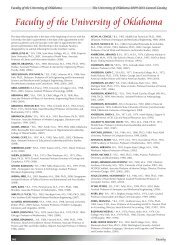2006-08 Course Descriptions - Catalog - University of Oklahoma
2006-08 Course Descriptions - Catalog - University of Oklahoma
2006-08 Course Descriptions - Catalog - University of Oklahoma
Create successful ePaper yourself
Turn your PDF publications into a flip-book with our unique Google optimized e-Paper software.
The Uni ver sity <strong>of</strong> <strong>Oklahoma</strong> <strong>2006</strong>-20<strong>08</strong> Gen eral Cat a logModern Languages, Literatures, and Linguistics (MLLL)etc. who have exercised outstanding leadership in combat. Focuses onleadership and application <strong>of</strong> the principles <strong>of</strong> war at the strategic,operational and tactical levels. Laboratory (Sp)4510 Seminar in Military Leadership. 1 to 3 hours. Prerequisite: juniorstanding and permission <strong>of</strong> department. May be repeated with change <strong>of</strong>content; maximum credit nine hours. Students will learn various theories <strong>of</strong>leadership and organizational culture and gain practical experience in theapplication <strong>of</strong> those theories within a peer leadership setting. Additionally,the course may include elements <strong>of</strong> military history, social theory, ethics,and military law. (Irreg.)4543 The American Military Experience. Prerequisite: 3113, 3213.Develops knowledge, understanding and a sense <strong>of</strong> historical-mindednessin future Army <strong>of</strong>ficers. Instruction focuses on the need to apply the lessons<strong>of</strong> history in the examination and treatment <strong>of</strong> contemporary militaryproblems with which the Army is confronted A mandatory staff ride to one<strong>of</strong> several <strong>Oklahoma</strong> battlefields is included. (Sp)4610 Comparative Military History. 1 to 3 hours. Prerequisite: 3610 orpermission <strong>of</strong> department chair. May be repeated; maximum credit threehours. Students will examine events leading to national and world crisis.Focus points will be socio-economic as well as goals and personalities <strong>of</strong>political and military leaders. (F, Sp)Modern Languages, Literatures,and Linguistics (MLLL)The department <strong>of</strong>fers courses which are slashlisted so undergraduatestudents may take an undergraduate 4000-level course while graduatestudents may take a graduate 5000-level course. The lectures in aslashlisted course are the same. However, students in the 5000-levelcourse have substantial additional requirements beyond those forstudents in the 4000-level course. These additional requirements arelisted in the slashlisted course syllabus.2003 Introduction to World Literature. Introduction to idea and practice<strong>of</strong> comparative literature study. Focus will be on a particular body <strong>of</strong>literature (e.g., Italian post-WWII fiction, French-Canadian poetry <strong>of</strong> thenineteenth century, etc.) as shaped by other cultures and literature. Textswill be in original language and translation. (Irreg.) [IV-WC]3000 Literature in Translation. May be repeated with change <strong>of</strong> subjectmatter; maximum credit nine hours. Appreciation and analysis <strong>of</strong> poetry,novel, prose, drama, or film translated into English. (F, Su)3043 Mythology and Folklore (Crosslisted with Anthropology 3043).The nature and function <strong>of</strong> myth and folklore in human societies and theuses to which the study <strong>of</strong> folklore have been put by anthropologists in bothfunctional and culture-historical analyses <strong>of</strong> preliterate societies. (F, Sp) [IV-WC]3063 Survey <strong>of</strong> Jewish Literature from Antiquity to the Present. Prerequisite:junior standing. Provides a survey <strong>of</strong> Jewish literature from the Hebrew Bible tocontemporary American literature, presented as a journey in which stops willbe made at important places, covering all significant periods, genres andprominent writers. (F)3073 The Hebrew Bible as Literature. Prerequisite: junior standing.Provides a survey <strong>of</strong> Jewish literature from the Hebrew Bible tocontemporary American literature, presented as a journey in which stopswill be made at important places, covering all significant periods, genresand prominent writers. (F)3123 Russian Culture and Civilization. Considers the historical andcultural heritage <strong>of</strong> Russia through a study <strong>of</strong> its geography, history, religion,language, literature and the fine arts. Allows students to appreciate theglobal perspectives and cultural diversity. [IV-WC]3133 Soviet and Post-Soviet Cinema. Prerequisite: junior standing.Familiarizes students with the history <strong>of</strong> film in the Soviet Union, from thesilent movies <strong>of</strong> its beginnings to its manifestation at the present time. Noprevious knowledge <strong>of</strong> the Russian language is required. Russian social andpolitical issues explored through film. (F, Su)3143 Dostoevsky and His Age. Prerequisite: junior standing. Examination<strong>of</strong> the life and literary works <strong>of</strong> Fyodor Dostoevsky, with special attention tothe role the writer played in Russian and Western intellectual history.Reading assignments will include Crime and Punishment, The BrothersKaramazov, and several shorter works, all in English translation. (Irreg.) [IV-WC]3153 Russian Literature through Film . Prerequisite: junior standing.Students analyze classic Russian literary texts and the films that they haveinspired. This course focuses on the problem <strong>of</strong> cinematic adaptation. Noprevious knowledge <strong>of</strong> the Russian Language is required. (F, Su)3213 Japanese Theater and Performance. Prerequisite: junior standing. Asurvey <strong>of</strong> performance traditions in Japan ranging from rituals to dance andtheatre, from ancient to contemporary. Explores the role <strong>of</strong> theatre in societyand the relation between performance style and daily behavior. (F) [IV-NW]3223 Japan through Film and Literature. Prerequisite: junior standing.Introduces Japanese post-war society and culture with emphasis on 1945to the present, as reflected in film and literature. Students will examineessential issues, including class, family, gender, work, education, andminorities, paying attention to the struggles between traditional culturalvalues and modern society. (Irreg.) [IV-NW]3303 The World <strong>of</strong> Dante. Prerequisite: Junior standing and English 1213.In this course students will engage in a close reading <strong>of</strong> a fundamental textin the western literary tradition: Dante Alighieri’s Divine Comedy. Thecourse will also consider one <strong>of</strong> Dante’s minor works, the Vita Nuova, aswell as the modern critical readings <strong>of</strong> Dante’s writing and thought. Inlectures, special attention will be paid to the historical, political, literary andintellectual context <strong>of</strong> Dante’s poetry and thought. Students will also beasked to contribute to the classroom atmosphere by responding toquestions and participating in discussions. (Irreg.) [IV-WC]3373 Italian Cinema. Prerequisite: junior standing and English 1213. Theaim <strong>of</strong> this course is to develop interpretive skills relevant to the study <strong>of</strong>Italian cinema by examining some <strong>of</strong> its most significant films. Morespecifically, we will analyze the ways in which Italian society is portrayedand typified in Italian cinema. We will cover the major film movementsand periods, from “cinema muto” to Neorealism, from “commediaall‘Italiana” to the Italian horror genre and to the most recent works madeby contemporary directors. (Irreg.)3413 Arabic Literature and Culture. Prerequisite: junior standing. A survey<strong>of</strong> Arabic literature tradition and cultural history from the 4th century to thepresent. Covers themes and genres <strong>of</strong> the cultural heritage <strong>of</strong> Arabic-Islamiccivilization, continuities and discontinuities between the classical andmodern period, and background political and social changes. (F) [IV-NW]3423 Western Visions <strong>of</strong> the East/12 th -21 st Century. Prerequisite: juniorstanding. This course examines Western European representations <strong>of</strong> theMiddle East, North Africa, and Asia from the Middle Ages to today. The aimis to consider how western culture constructs the Oriental Other in poetry,prose, drama, and film. Edward Said’s “Orientalism” will serve as thecritical foundation for the course. (F)3523 Survey <strong>of</strong> Russian Literature to 1917 in Translation. Prerequisite:junior standing. Reading, analysis and discussion <strong>of</strong> key works <strong>of</strong> Russian19th century literature, including the major novels, plays, and poetryselections in English translation. This course does not satisfy the thirdsemester Arts and Sciences language requirement. (F)3533 Survey <strong>of</strong> Russian Literature from 1917 in Translation.Prerequisite: Junior standing. Representative works <strong>of</strong> Soviet andpost-Soviet literature are read and discussed. Selections <strong>of</strong> prose andpoetry chosen from among symbolists, acmeists, futurists, populists,modernists, and post-modernists. This course does not satisfy the thirdsemester Arts and Sciences language requirement. (Sp)3573 Arthurian Legend and Literature (Crosslisted with English 3573).Examination <strong>of</strong> the legend <strong>of</strong> King Arthur in European literature.Concentrate first on the historical Arthur, followed by major portion <strong>of</strong>semester on the medieval and modern literary texts concerning Arthur andthe Round Table. All texts will be read in English translation. [IV-WC]3633 Modern Japanese Literature and Culture. Prerequisite: juniorstanding. A survey <strong>of</strong> Japanese literature from the Meiji restoration (1868)onward, with attention to social, political, and cultural issues as well asliterary theory. Topics will include Japan‘s “westernization,” “naturalism,”proletarian literature movements, early post-war literature, and the “thirdnew generation writers.” (Sp) [IV-NW]3643 Japanese Education Through Fiction. A discussion <strong>of</strong> Japaneseeducation through fiction. Fiction is used as a “tool” to explore this complexsubject, and the selected novels and short stories will be examined from aspecific perspective. Topics will include the occupation reform, “educationexplosion,” “exam hell,” school violence and cram schools. [IV-NW]3753 Modern Chinese Literature and Culture. Prerequisite: juniorstanding. Students will read Chinese literary texts in English translation and<strong>Course</strong> <strong>Descriptions</strong> 154


